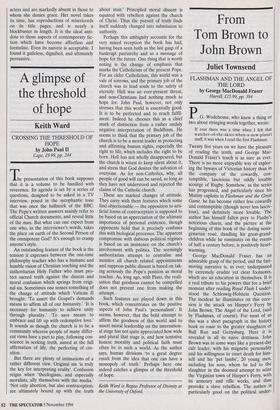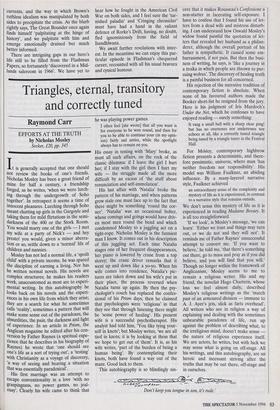From Tom Brown to John Brown
Juliet Townsend
FLASHMAN AND THE ANGEL OF THE LORD by George MacDonald Fraser Harvill, £15.99, pp. 394.
P. G. Wodehouse, who knew a thing or two about stringing words together, wrote:
If ever there was a time when I felt that watcher-of-the-skies-when-a-new-planet stuff, it was when I read the first Flashman.
Twenty five years on we have the pleasure of reading the tenth, and George Mac- Donald Fraser's touch is as sure as ever. There is no more enjoyable way of explor- ing the byways of Victorian history than in the company of the cowardly, con- temptible, lascivious but oddly lovable scourge of Rugby. Somehow, as the series has progressed, and particularly since his Mutiny exploits in Flashman and the Great Game, he has become rather less cowardly and contemptible (though never less lasciv- ious), and definitely more lovable. The author has himself fallen prey to Flashy's notorious charm, and the picture at the beginning of this book of the doting nona- genarian roue, dandling his great-grand- children while he ruminates on the events of half a century before, is positively heart- warming.
George MacDonald Fraser has an admirable grasp of the period, and the fast- moving narrative is, as ever, underpinned by extremely erudite yet clear footnotes, which are an education in themselves. It is a real tribute to his powers that for a brief moment after reading Royal Flash I under- stood the Schleswig-Holstein Question. The incident he illuminates on this occa- sion is the attack on Harper's Ferry by John Brown, The Angel of the Lord, (and by Flashman, of course). For most of us this was a short paragraph in the history book en route to the greater slaughters of Bull Run and Gettysburg. Here it is revealed in all its naive dottiness. John Brown was in some ways like a present-day cult leader, with his magnetic personality and his willingness to court death for him- self and his 'pet lambs', 20 young men, including his sons, whom he led to the slaughter in the doomed attempt to seize the Virginian town of Harper's Ferry, with its armoury and rifle works, and thus provoke a slave rebellion. The author is particularly good on the political under- currents, and the way in which Brown's ruthless idealism was manipulated by both sides to precipitate the crisis. As the blurb rightly says, The Great Bounder once again finds himself 'palpitating at the hinge of history', and we palpitate with him and emerge emotionally drained but much better informed.
There are intriguing gaps in our hero's life still to be filled from the Flaslunan Papers, so fortunately 'discovered in a Mid- lands saleroom in 1966'. We have yet to hear how he fought in the American Civil War on both sides, and I feel sure the 'tar- nished paladin' and 'Cringing chronicler' must have had a hand in the valiant defence of Rorke's Drift, having, no doubt, fled ignominiously from the field of Isandhlwana.
We await further revelations with inter- est. In the meantime we can enjoy this par- ticular episode in Flashman's chequered career, recounted with all his usual bravura and cynical humour.











































































 Previous page
Previous page